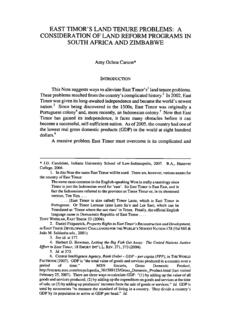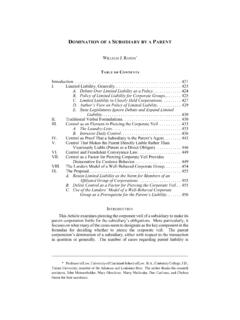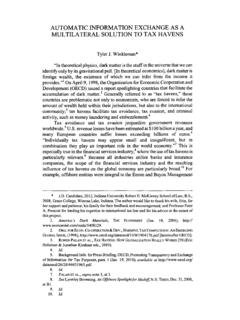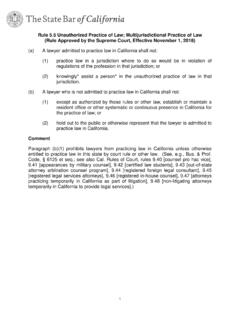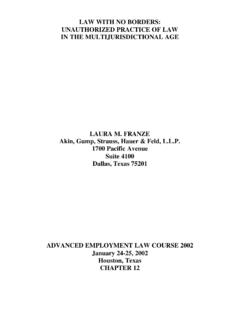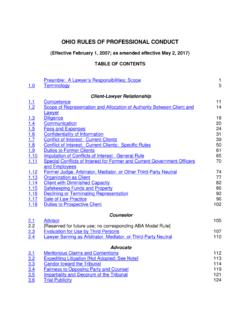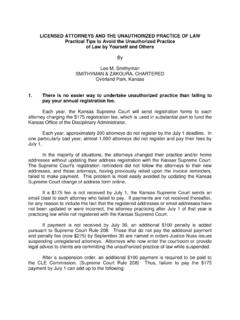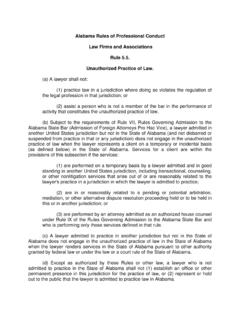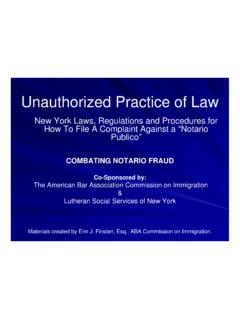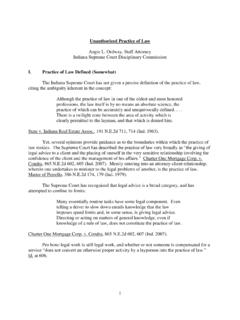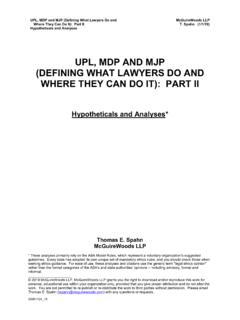Transcription of ACCOUNTING FIRMS AND THE UNAUTHORI ZED PRACTIC E …
1 * Candidate, 2000, Indiana University School of Law Indianapolis; , 1997,Indiana University-Purdue University Kenneth Li, Merger of Price Waterhouse, Coopers firm Creates Big 5, , Sept. 19, 1997, at A12 (explaining that through mergers the Big Eight have been reducedto the Big Five); BLACK S LAW DICTIONARY 163 (6th ed. 1990) (defining Big Eight to be thelargest certified public ACCOUNTING FIRMS in the United States based on such factors as gross receipts,number of staff, etc.); Dennis Taylor, Merged PriceWaterhouseCoopers Gains Dominance AmongVenture Capital FIRMS , BUS. J., Aug. 24, 1998, at 1 (listing the Big Five as:PriceWaterhouseCoopers , Arthur Andersen , KPMG Peat Marwick , Deloitte& Touche , and Ernst & Young ).
2 Robert W. Scott, CPA FIRMS Are Not Just for ACCOUNTING Anymore, ACCT. TODAY,Mar. 17, 1997, at 24 (reporting that ACCOUNTING FIRMS hold equity in subsidiaries and affiliates thathave little to do with ACCOUNTING ). Practice: Professionals Eye Entry of ACCOUNTING FIRMS into What MayConstitute Practice of Law, 10 LAW. MAN. ON PROF. CONDUCT (ABA/BNA) 269, 269 (June 10,1998) [hereinafter unauthorized Practice]; see also Gina Binole, Bean Counters Eyeing Attorneys Profits, BUS. J. PORTLAND, Dec. 4, 1998, at 1 (reporting that the Big Five are heavily recruitinglaw students and luring associates away from legal FIRMS ); Rick Desloge, Law FIRMS CompetitionComing from Accountants, NASHVILLE BUS. J., Feb. 26, 1999, at 34 (noting that [t]he twoprofessions already compete to hire top tax lawyers.)
3 Mark Henderson, ACCOUNTING FIRMS Do Number on Lawyers, SUNDAY STAR-TIMES,Nov. 1, 1998, at Amanda Bishop, Law Panel Probing Big Six FIRMS Attorneys Ask if AccountantsAre Practicing Law Without Authorization, DALLAS BUS. J., June 5, 1998, at generally Cindy Kirscher Goodman, Line Between ACCOUNTING , Law ProfessionsMay Soon Blur, KNIGHT-RIDDER TRIB. BUS. NEWS, Mar. 14, Michael Fitz-James, Multidisciplinary Practice Evokes Multiple Fears, FIN. POST, ACCOUNTING FIRMS AND THE unauthorized PRACTICEOF LAW: WHO IS THE BAR REALLY TRYING TO PROTECT?ELIJAH D. FARRELL*INTRODUCTIONFrom the Big Five to the smallest companies, ACCOUNTING FIRMS are1expanding into nontraditional businesses more than ever before. As a result,2accounting FIRMS are increasingly adding lawyers as employees who cancontribute to the services that the FIRMS provide their ACCOUNTING or financialservices clients.
4 Much of the new business ACCOUNTING FIRMS are undertaking3is a natural extension of services already being offered. Tax practice is an4obvious example of this extension. 5 The growing concern among lawyers is that accountants are moving intotheir territory. Many lawyers feel, because of their size and reach, that if the Big6 Five expand into legal services, then they will immediately dominate the has law FIRMS worried because ACCOUNTING FIRMS already dominate businessconsulting services in the global marketplace. The problem, of course, is that8600 INDIANA LAW REVIEW[Vol. 33:599 Aug. 12, 1997, at example, the Indiana law states: A lawyer or law firm shall not share legal feeswith a nonlawyer .. IND. R. PROFESSIONAL CONDUCT, Rule (a) (1996).]
5 See generallyElizabeth MacDonald, ACCOUNTING FIRMS Hire Lawyers and Other Attorneys Cry Foul, WALL , Aug. 22, 1997, at Luisa Beltran, Turf War Between Attorneys and Accountants Becomes Nasty.(Attorneys Filing Lawsuits Against Accountants for unauthorized Practice of Law), ACCT. TODAY,Nov. 24, 1997, at John Gibeaut, As Accountants Edge into the Legal Market, Lawyers May FindThemselves Not Only Blindsided by the Assault but Also Limited by Professional Rules, 84 , 44 (1998); see also Desloge, supra note 3, at 34 (reporting CPAs insist they are not interestedin practicing law. ). Gibeaut, supra note 11, at id. at multidisciplinary partnership has been defined as a business arrangement in whichindividuals with different professional qualifications practice together in partnership and combinetheir different skills in providing advice and counsel to the consumers of their services.
6 GordonW. Flynn & Susan Billington, Multidisciplinary practices , 50 BENCHERS ADVISORY 1, 2 (June1997). Rubenstein, Big Six Poised to Enter Legal Market, Privilege, Professional Rulesand Conflicts Are a Barrier, MERRILL S ILL. LEGAL TIMES, Oct. 1997, at 1 (col. 1). Larry Smith, Attorneys v. CPAs .. Texas Case Crystallizes Competitive PracticeIssues for Major FIRMS , 17 NO. 4 OF COUNS., Feb. 16, 1998, at 1, Bishop, supra note 6, at employed by ACCOUNTING FIRMS cannot represent their clients in the roleof attorneys because state laws prohibit, among other things, lawyers fromsharing their fees with nonlawyers. As the ACCOUNTING FIRMS expand out of tax9returns and into new areas of tax and business services, attorneys across thecountry are charging certified public accountants ( CPAs ) with the unauthorizedpractice of law.
7 10In their defense, ACCOUNTING FIRMS contend that their attorneys are notpracticing law. This distinction, however, may be only a matter of many lawyers consider practicing law, accountants prefer to describe as consulting. This highlights the fundamental difference between the two13professions: accountants have a duty to be objective and publicly disclosefinancial statements; whereas, lawyers have an obligation to act as guardians oftheir clients interests. 14 Every state has laws that address many of these interrelated issues: multidisciplinary partnerships, the unauthorized practice of law, the15professional responsibility of a lawyer, conflicts [of interest], and fee splitting.
8 16 However, due to a lack of case law in these areas, many of these issues have yetto be resolved. Indeed, where consulting ends and practicing law begins17is a relatively undistinguished any event, the rules that currently prevent lawyer-accountants from2000] ACCOUNTING Binole, supra note 3, at 1; Gibeaut, supra note 11, at 47; David Segal, Rivals CallLaw FIRMS to Account; Tax Advisers Hope to Cross a Line and Compete for Legal Clients, , Nov. 12, 1998, at Geoffrey C. Hazard, Accountants vs. Lawyers: Let s Consider Facts, NAT L ,Nov. 9, 1998, at Balestier, ABA Faces Arrival of Lawyer-Accountant Pairings, , Nov. 19,1998, at generally Goodman, supra note Binole, supra note 3, at , , Matthew A. Melone, Income Tax Practice and Certified Public Accountants:The Case for a Status Based Exemption from State unauthorized Practice of Law Rules, 11 AKRONTAX J.
9 47 (1995) (arguing that lay CPAs possess the requisite proficiency to practice tax law). , , Rubenstein, supra note 16, at 1 (noting that at least some believe that theexpansion of ACCOUNTING FIRMS will continue until the Big Five dominate transactional business lawglobally). MODEL RULES OF PROFESSIONAL CONDUCT Rule (1995). id. at (1983).practicing law could soon be rewritten. This trend has many in the legal19profession worried. Some are concerned about professional identity andtradition. Others are concerned over the disparity between each profession s20concept of ethical duty, and the difficulty of reconciling the two standards underone roof. Yet another concern is self-preservation, which is a reason why2122state bars across the country are closely monitoring these Note examines the laws that prohibit an attorney employed in anaccounting capacity from performing the same types of duties as an attorneyemployed in a legal capacity.
10 Central to this examination are state lawsgoverning the associations of lawyers with nonlawyers which restrict the typesof activities that lawyers working for ACCOUNTING FIRMS may engage in. This Note deals only with issues involving lawyers employed in anaccounting capacity. While members of this group may hold CPA credentials aswell, this article does not argue in favor of permitting nonlawyer CPAs topractice law, though some certainly support such a position. Furthermore, this24 Note focuses primarily on the area of tax practice, though some have concernsthat ACCOUNTING FIRMS are expanding into other areas of legal practice as I will address the growing tension between law FIRMS and accountingfirms. Part II will examine what constitutes the unauthorized practice of law,including the various standards courts use to make this determination and howthose standards have evolved.


